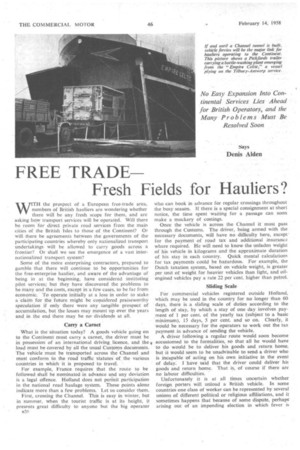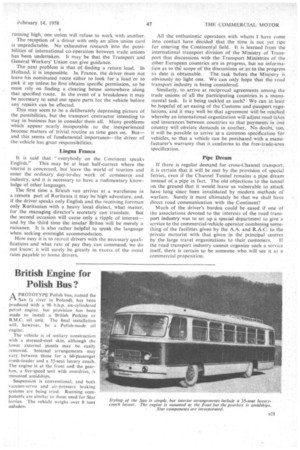FREE TRADE Fresh Fields for Hauliers?
Page 54

Page 55

If you've noticed an error in this article please click here to report it so we can fix it.
WITH the prospect of a European free-trade area, numbers of British hauliers are wondering whether there will be any fresh scope for them, and are asking how transport services will be operated. Will there be room for direct private road services from the main cities of the British Isles to those of the Continent? Or will there be agreements between the governments of the participating countries whereby only nationalized transport undertakings will be allowed to carry goods across a frontier? Or shall we see the emergence of a vast internationalized transport system?
Some of the more enterprising contractors, prepared to gamble that there will continue to be opportunities for the free-enterprise haulier, and aware of the advantage of being in at the beginning, have considered instituting. pilot services; but they have discovered the problems to be many and the costs, except in a few cases, to be far from economic. To operate initially, at a loss in order to stake a claim for the future might be considered praiseworthy speculation if only there were any tangible prospect of accumulation, but the losses may mount up over the years and in the end there may be no dividends at all.
Carry a Carnet What is the situation today? A goods vehicle going on to the Continent must carry a carnet, the driver must be in possession of an international driving licence, and the 0 load must be covered by all the usual Customs documents. The vehicle must be transported across the Channel and must conform to the road traffic statutes of the various countries in which it is proposed to travel.
For example, France requires that the route to be followed shall be nominated in advance and any deviation is a legal offence. Holland does not permit participation in the national road haulage system. These points alone indicate more than a few problems. Let us consider them.
First, crossing the Channel. This is easy in winter, but in summer, when the tourist traffic is at its height, it presents great difficulty to anyone but the big operator p20 who can book in advance for regular crossings throughout the busy season. If there is a special consignment at short notice, the time spent waiting for a passage can soon make a mockery of costings.
Once the vehicle is across the Channel it must pass through the Customs. The driver, being armed with the necessary documents, will have no difficulty here, except• for the payment of road tax and additional insuranc: where required. He will need to know the unladen weight of his vehicle in kilograms and the approximate duration of his stay in each country. Quick mental calculations for tax payments could be hazardous. For example, the Dutch taxation system, based on vehicle weight, is greater per unit of weight for heavier vehicles than light, and oilengined vehicles pay a rate 22 per cent higher than petrol.
Sliding Seale For commercial vehicles registered outside Holland, which may be used in the country for no longer than 60 days, there is a sliding scale of duties according to the length of stay, by which a stay of one day involves payment of 1 per cent. of the yearly tax (subject to a basic minimum), 15 days, 5 per cent, and so on. Clearly, it would be necessary for the operators to work out the tax payment in advance of sending the vehicle.
A driver following a regular route would soon become accustomed to the formalities, so that all he would have to do would be to deliver his goods and return home, but it would seem to be unadvisable to send a driver who is incapable of acting on his own initiative in the event
of delay. have said that the driver could deliver his goods and return home. That is, of course if there are no labour difficulties,
Unfortunately it is at all times uncertain whether foreign porters will unload a British vehicle. In some countries one class of worker can be represented by several unions of different political or religious affiliations, and it sometimes happens that because of some dispute, perhaps arising out of an impending election in which fever is running high, one union will refuse to work with another.
The reception of a driver with only an alien union card is unpredictable. No exhaustive research into the possibilities of international co-operation between trade unions has been undertaken. It may be that the Transport and General Workers' Union can give guidance.
The next problem is that of finding a return load. In Holland, it is impossible. In France, the driver must not leave his nominated route either to look for a load or to pick it up unless he first'obtains"specifie permission, so he must rely on finding a clearing house somewhere along that specified route. In the event of a breakdown it may be necessary to send out spare parts for the vehicle before any repairs can be effected.
This may seem to be a deliberately depressing picture of the possibilities, but the transport contractor intending to stay in business has to consider them all. Many problems which appear nearly insuperable to the inexperienced become matters of trivial routine as time goes on. But— and this seems of fundamental importance--the driver of the vehicle has great responsibilities.
Lingua Franca It is said that "everybody on the Continent speaks English." This may be at least half-correct where the tourist is concerned, but leave the world of tourism and enter the ordinary day-to-day work of commerce and industry, and it is necessary to have a rudimentary knowledge of other languages.
The first time a British van arrives at a warehouse in a remote part of Ruritania it may be high adventure, and, if the driver speaks only English and the receiving foreman only Ruritanian with a heavy local dialect, what matter, for the managing director's secretary can translate. But the second occasion will cause only a ripple of interest-and by the third time the insular Briton will be merely a nuisance. It is also rather helpful to speak the language when seeking overnight accommodation.
How easy it is to recruit drivers with the necessary qualifications and what rate of pay they can command, we do not know; it will surely be greatly in excess of the usual rates payable to home drivers.
All the enthusiastic operators with whom 1 have come into contact have decided that the time is not yet ripe for entering the Continental field. It is learned from the international transport division of the Ministry of Transport that discussions with the Transport Ministries of the other European countries are in progress, but no inform.tion as to the scope of the discussions or as to the progress
to date is obtainable. The task before the Ministry is obviously no light one. We can only hope that the road transport industry is being considered.
Similarly, to arrive at reciprocal agreements among the trade unions of all the participating countries is a monumental task. Is it being tackled as such? We can at. least be hopeful of an easing of the Customs and passport regulations, and it may well be that agreement will be reached whereby an international organization will adjust road ties and insurances between countries so that payments in one country will obviate demands in another. No doubt, too, it will be possible to arrive at a common specification for vehicles, so that a vehicle can be purchased with a manufacturer's warranty that it conforms to the free-trade-area specification.
Pipe Dream If there is regular demand for cross-Channel transport. it is certain that it will be met by the provision of special ferries, even if the Channel Tunnel remains a pipe dream instead of a pipe in fact. The old objections to the tunnel on the ground that it would leave us vulnerable to attack have long since been invalidated by modern methods of warfare. Surely it must ultimately be that we shall have direct road communication with the Continent?
Much of the driver's burden could be eased if one of the associations devoted to the interests of the road transport industry was to set up a special department to give a service to the commercial-vehicle operator combining something of the facilities given by the A.A. and R.A.C. to the private motorist with that given in the principal centres by the large travel organizations to their customers. If the road transport industry cannot organize such a service itself, there is certain to be someone who will see it as a commercial proposition.




















































































































